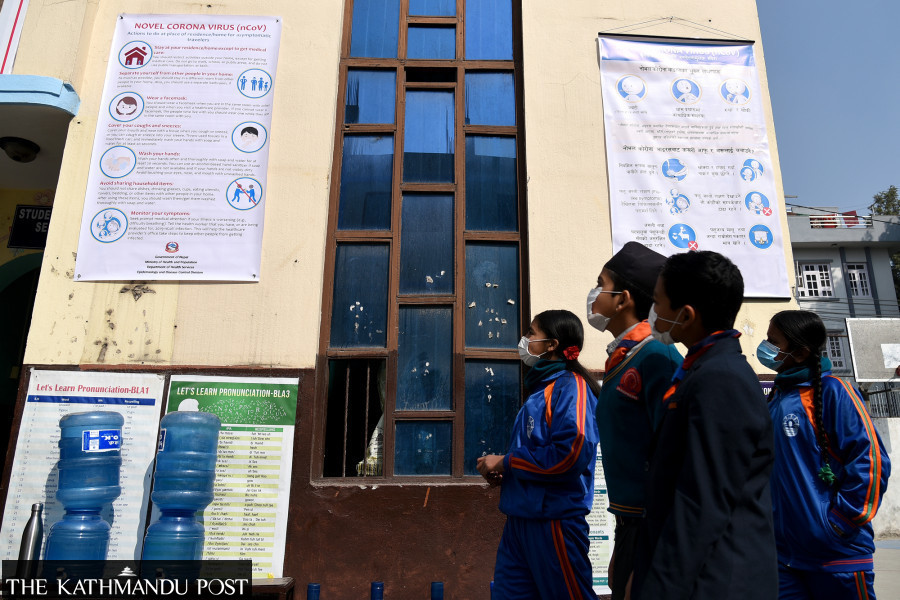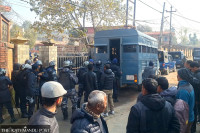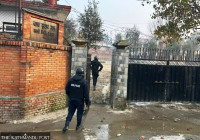Valley
Kathmandu schools are reopening next week but many parents and experts are worried
Most private schools in the Capital are being run in rented buildings with small rooms and little open space. Imposinghealth protocol and maintaining distance is thus difficult.
Anup Ojha
Nabin Khanal and his wife Saraswati of Ranibari, Kathmandu are worried about sending their nine-year-old son to school after the school recently informed that it is reopening for in-person classes next week.
“My son’s school principal has already asked me to send my kid to school. This has worried us,” said Khanal, who himself is a lecturer at college in Kathmandu. The family lives in a rented apartment.
His son Nitesh is a third grader at a private school nearby. “Even doctors have been saying that children are the most vulnerable to Covid-19 in the event of a third wave. How can we send my son to school,” said a worried Khanal.
Despite most of the experts, educationists and guardians remaining opposed to the idea of reopening schools immediately, a meeting attended by Kathmandu’s chief district officer and local unit officials on September 6 has decided to resume physical schooling from September 17.
“We were okay with the existing online classes. How can a child follow the health protocols — wear masks, sanitise continuously and maintain physical distance? For children that will be simply impossible,” said Khanal.
On September 2, the Kathmandu Metropolitan City’s education board issued a circular to reopen schools. This had met with criticism and stakeholders had suspected the decision was guided by vested financial interests of private school operators.
Like Khanal, Maya Sris Rana, 43, who is a teacher at a community school in Mahalaxmisthan, Lalitpur too is concerned about children’s health in the event of the schools’ failure to effectively enforce health protocols.
“This is a big dilemma because many community schools like ours have not been able to run online classes for lack of online learning infrastructure, so such students would benefit from schools resumption. But at the same time there is a greater risk of virus transmission as enforcing health protocol in schools is a big challenge,” said Rana
“I see private school operators’ self-serving interests in the decision because they can charge students full fees if physical classes are resumed. But they are putting children’s lives at risk,” said Rana, a mother of two school-going siblings. Her son Buland studies in grade eight at St Xavier’s School in Godavari and daughter Priyanka is a 12th grader at St Mary's School in Jawalakhel.
“I have not received formal notices from my children’s schools but if they reopen they may follow the health protocols,” said Rana. “But children are not vaccinated so there is a greater risk of virus transmission. And if the school where I teach is not well-managed, virus transmission risk would be higher there,” she added.
Like Khanal and Rana, hundreds of parents in Kathmandu are apprehensive about sending their kids to school as the daily Covid-19 infection numbers are still higher, at around 1,000. On Friday the country reported a total of 1,146 new cases of the virus, with 21 Covid-19 related fatalities.
“Who will be responsible if children get infected or die,” asks Khanal.
Although new Covid-19 cases are declining over the past few days, the number of daily deaths has remained somewhat the same —18 on an average and on Friday it was 21, which experts say is quite challenging, so the authorities should not rush to reopen schools.
Dr Sher Bahadur Pun, chief of Clinical Research Unit at Sukraraj Tropical and Infectious Disease Hospital in Teku says the danger is still there, as the number of daily cases is still over 1,000.
“Before schools are reopened they should make necessary modifications to their infrastructures including classrooms, schoolbuses, toilets and playgrounds among other things to prevent disease transmission,” said Pun.
He is among the experts who have long been warning that children will be at high risk if the third wave grips the country as they are not vaccinated and Nepal does not have enough pediatric health facilities and health workers to handle a pandemic situation.
Some parents, meanwhile, are of the view that their kids are stressed with virtual learning and they are equally willing to send them to school. “But you can see most of the private schools are being run in rented buildings with smaller classrooms and little open space. So maintaining physical distance at such schools is difficult,” said Khanal.
Schools and colleges across the country were closed since March 18 last year and after nearly nine months, from the third week of January this year, some of them reopened only to be closed three months later. This indefinite shutdown of school has had an inordinate effect on children mainly from poor economic backgrounds across the country. A UNICEF research showed that school closure has led to alarming inequities in learning opportunities for children in South-Asia.
Although the authorities have decided to reopen schools, parents like Khanal and Rana say there is no point in opening schools as the biggest festivals Dashain and Tihar, which see long school holidays, are near. Dr Pun also agrees.
“If only the schools use the festival time to modify their school infrastructures to tackle Covid, it would be helpful in mitigating the transmission risk,” said Pun.
However, Suprabhat Bhandari, chairperson of the Guardians Federation Nepal thinks schools won’t do that. “Because private schools’ primary concern is profit and they don’t have proper school infrastructure to make major modifications. They are less concerned about students’ safety,” said Bahndari.
“It is okay to reopen schools in rural areas where there are no virus cases, because most of the community schools have very fewer student numbers —less than 100, and virtual learning has not been working for them in lack of laptops, cell phones and internet. But in places like Kathmandu, reopening would be risky,” said Bhandari.




 10.12°C Kathmandu
10.12°C Kathmandu.jpg)











